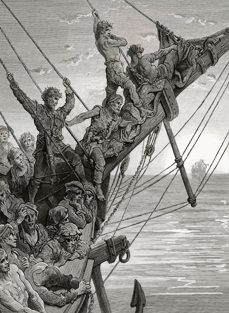The Inspiration
Relevance Today
You’re working on a key project at work that has to be completed on a tight timeline. You’re having a team meeting and almost everyone on the team is pushing hard and working to get their components completed on time. But there’s one team member who was assigned to the project because there was no other place to put him. He’s not meeting his deadlines and he doesn’t seem to care. You throw your hands up in frustration and say to yourself, “What did I do to deserve this? He’s a damn albatross around my neck.”
You’re watching the news and seeing reports about the latest environmental disaster; birds covered with black, gooey oil, dead fish, poisoned water. You listen to those who refuse to accept that global warming might be taking place and who want fewer environmental controls regardless of the harm that pollution might cause to people, plants and animals. You recall some words that you once heard:
In our modern technology saturated society, we take for granted these words that have floated around our society for hundreds of years. In today’s Internet age we absorb words of wisdom from anyone who has a Twitter account or has a Facebook posting or a LinkedIn account. It’s easy to forget the wisdom of the ages or the picture created by the words of the great poets and authors.

Samuel Taylor Coleridge wrote the words above in italics in 1798 in his poem, “The Rime of the Ancient Mariner.” The poem describes a sea journey in the late 1700’s that ends in tragedy with the only survivor being the Mariner. When the sailing ship is becalmed in a windless ocean, the crew is dying of thirst. A huge bird, the albatross that had apparently brought the ship good luck is meaninglessly killed by a crossbow fired by the mariner. As punishment for killing the albatross, it is hung around the mariner’s neck. In the end, the mariner is somewhat redeemed by understanding the need to love “all things both great and small”.
One might ask why do the lines from poems and stories from the distant past stay with us through the centuries? It is because these words create pictures in our minds akin to postings to our internal Facebook pages. A lesson taught through a well-structured metaphor, a well crafted story or a beautifully written poem can craft images that stay in our minds and form lessons that we will never forget.